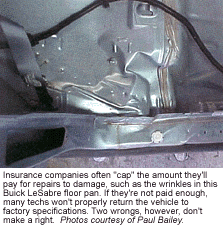The diminished value movement wasn’t created by repairers wanting to nit-pick competitors’ work. Shops producing poor quality repairs are the ones who’ve created a thriving market for post-repair inspections
and repair-related DV.

A growing number of shop owners and managers won’t hesitate to tell you that the diminished value (DV) movement is the best thing that’s happened to the collision industry since, well, since there’s been a collision industry.
Others, however, think shops that perform post-repair inspections are the scourge of the industry. “I don’t want a competitor nit-picking my work,” these shop owners argue.
But DV isn’t about nit-picking. It’s about doing the very best work you possibly can and demanding proper compensation for it. Unfortunately, so many shops are churning out poor quality repairs, which often jeopardize their customers’ lives, that a thriving market for post-repair inspections and repair-related DV has been created. (It’s ironic that the shops most argumentative about DV are the ones responsible for its existence.)
But whether or not you own a DV shop doesn’t matter. What matters is that your shop turns out first-class quality repairs that can stand the test of anyone’s scrutiny.
I Know a Shortcut
The average collision repairman these days isn’t really all that good at what he does. While many techs do possess the skills necessary to perform first-class quality collision repairs, a large number of techs very seldom put all those skills to use every day. Due to the continually increasing cost of living and the stagnant level of wages in the collision industry, many techs are constantly on the lookout for another shortcut.
While some shortcuts used by collision techs may not put the customer’s life at risk, many are turning vehicles into literal death traps. The bodymen using these shortcuts often justify their methods by blaming insurance companies for their refusal to pay reasonable rates for repairs.
“The insurance companies don’t care if you do it right,” remarked one shortcutter I knew. “They just want it done fast and cheap.”
Little does he realize, when one of his customers is severely injured or killed in a subsequent accident, no one will care how low the estimate was written. You can’t justify unsafe repairs with the statement, “I didn’t get paid enough to do it right.”
What if insurance companies paid top dollar for all procedures performed? How many techs would then take the time to perform nothing but first-class quality repairs? I’ve seen techs with the skills to perform such repairs take shortcuts, and I’ve wondered whether those techs would abandon the shortcuts if the paperwork were written to cover every necessary procedure. Though some techs would take the time to do the job right if they were paid accordingly, in my opinion, a large percentage of the industry would continue to use shortcuts. An unfortunate reality for us all.
Consider, for instance, the radiator support that’s installed with a dozen or so tack welds for 6.5 hours. If the shop owner goes over the repair with a fine-toothed comb to squeeze out another four hours, how many techs would still install the radiator support with the same dozen or so tack welds? The answer is too many. This is the argument the insurance industry uses to justify the low payment, and the way I see it, they’re well justified. Why should the insurance industry pay extra for procedures that at least half of the collision industry wouldn’t perform even when paid? With so many techs in the collision industry who possess the ability to do top-quality work but never use that ability, how will we ever be able to demand payment for all procedures?
Clear as Mud
A very large portion of the collision industry – maybe even you and your techs – has been misinformed about the DV movement. Many believe DV practitioners are doing nothing more than nit-picking their competitors’ repairs. But a DV inspection doesn’t always find fault in the repairs, so a top-quality repairer shouldn’t have anything to worry about in the event of a DV inspection. From anyone’s point of view, the best way to survive a DV inspection is to perform every procedure the insurance company paid for and to do the job right. Top quality repairs with no shortcuts will survive the scrutiny of DV practitioners every time.
Another misunderstood concept is that every wrecked and repaired vehicle loses value, no matter how perfectly it’s repaired. Inherent DV is caused by the average consumer’s belief that damaged goods can never be the same again. Even if you repair a vehicle in such a way that other collision repairmen can’t detect the damage, the knowledge of the damage to the vehicle will still reduce its market value. While some techs see this as a no-win situation, the fact remains that you can remove all liability for DV from yourself simply by charging for and performing all necessary procedures.
Unfortunately, many techs have performed free procedures for so many years now that they’ve come to accept those procedures as “part of the job.” I’ve met dozens of techs who had no idea how much free work they were giving away because they never took the time to study the P pages. Some techs even think you can’t get paid for P-page procedures. “The insurers pay what they want,” I’ve been told. “There’s nothing you can do about it.”
I recently spoke with a painter who didn’t realize he should be paid extra to back tape door jambs or to color sand and buff after painting. “I’ve always just done it,” he said. “I haven’t seen time on any RO for buffing or taping jambs since I’ve been in the business.”
“Don’t you ever look at the P pages in the front of the crash books to see what you’re supposed to be paid?” I asked.
“No,” he replied. “Who pays any attention to that?”
I still shudder at the memory of that conversation, realizing that even though I’m making progress, I still have a whole lot of mountain left that needs to be climbed.
When I mention Wreck Check or Accident Check to shop owners, managers or techs, the most common response is, “What’s that?” The only other response is something like, “I don’t think I’d want something that would put me out of business.”
What does that say about their confidence in their shop’s repair quality?
Many shop owners have heard about DV systems through insurance representatives who’ve told them how much the insurance companies hate DV systems and how much they fight to keep customers away from DV operators. And since most of the collision industry still thinks it has to rely on the insurance industry for business, it tends to bow down to it.
But by giving in to the insurance industry, shop owners make it more and more difficult every year for them and their techs to make a living without taking shortcuts. Of course, many shop owners don’t mind the shortcuts as long as the car gets finished in a hurry and everybody makes money.
By shortcutting the process, giving away free procedures and getting the cars out in a hurry, many shops are saving insurers money, so they’ll always have plenty of work. But they fail to see the damage they’re doing to the collision industry as a whole and to their techs’ work ethic. Top quality techs are leaving the industry for other lines of work, and new trainees are learning that you have to use the shortcuts to make money in this business.
Too many shops are full of fast techs but no good techs. The collision industry complains about a lack of technicians, but when it comes right down to it, it’s more important to many shop owners to keep insurers happy than it is to get their techs properly compensated. At the same time, good collision repair technicians are doing side jobs on the weekends to make ends meet. (If you think your techs don’t notice this, think again.)
Quality Is No. 1
One Internet bulletin board poster recently expressed concerns about losing 25 percent of his business if he stood up to an insurance company. That’s not exactly a small chunk of business to lose, but that’s also assuming that none of those customers would’ve chosen his shop had it not been for the insurance company’s referral. Shop owners should consider that if an insurer recommends one shop and a friend or co-worker recommends another, a lot of people will go with the friend’s recommendation. Also consider that if only 25 percent of your business comes from insurer referral program(s) and your shop is removed from the program, you could probably make up most of that loss by charging full price for all necessary procedures. (And perhaps eliminate some repair shortcuts in the meantime.)

By charging for all procedures, you increase your bottom line, the amount of time your techs can spend on the job and the amount of money your techs make on each repair. And those techs who are willing and able to perform first-class quality repairs are better compensated and less rushed in their work. Isn’t it worth the loss in business to have your techs produce top-quality repairs with fewer customer complaints, higher profits and more word-of-mouth referrals instead of those costly insurance referrals? And if your techs are making money even after they take the time to do every job right, won’t they be much happier at their job? Won’t they be more likely to stick around for years to come? I’d bet that long-term techs doing top-notch repairs for full price will keep you in business and make you as much or more money than any insurance referral program.
Whether or not you’re a DV facility, your techs must understand that they have to perform every procedure for which they’re paid. Hold them responsible. When techs disassemble a vehicle to find that a certain part on the repair order isn’t needed, those techs who toss the part in the dumpster and want to be paid for replacing the part anyway shouldn’t last long in any shop. Every part on the repair order has to be installed on the vehicle, or that tech should be out of a job. Every repair must be of the very finest quality because of the scrutiny under which today’s repairs are placed.
You see, the idea behind the DV movement is that the insurance company must pay for all necessary procedures and that those procedures must be performed in order to maintain the vehicle’s market value. Repairs have to be of such quality that they cannot be detected. Detectable repairs will diminish the value of the vehicle. Your techs must understand that the quality of each and every repair will have to be such that any loss in value suffered will not be repair related. Such high-quality standards would be a definite disadvantage to any metal or paint tech who isn’t ready, willing and able to produce the finest repairs humanly possible. So be sure your techs are up to the challenge.
Withstanding Scrutiny
What’s the solution to this lack of quality repairs coming out of so many shops? Consumer education for one. Ask around town for the best steaks or the best barbecue, and you’ll get an answer from just about everybody. Ask people where to take your wrecked car for repairs, and nobody has a clue. That needs to change. People need to know as much about collision repair as they know about meat and potatoes. When the average consumer knows collision repair as well as he knows food, the average consumer will put poor-quality repairers out of business.
DV may or may not be part of this answer to the poor-quality problem plaguing the industry. But if more shops would implement some of the management techniques used by the DV shops I’m familiar with, we could all improve the quality of repairs that have come to be accepted as industry standards.
In my opinion, if there were more DV shops, more of the industry would be forced to take responsibility for the work they do. And though it would create some division, the better quality shops would fare well and some of the mediocre shops would improve the quality of their work.
If you own a shop and have a reputation in your community for producing the very finest quality repairs possible, then a DV system just might be the best thing you can do for your business and for your technicians. If I owned a shop with a reputation for top quality, I’d probably run a DV shop because I’d enjoy providing that service to customers. People need to know the truth about their cars and collision repair. And I enjoy telling them.
Writer Paul Bailey, a contributing editor to BodyShop Business, has been a collision repairman for 17 years and is an avid photographer and writer who maintains a consumer-awareness Web page in his spare time. He resides in Florida with his wife, Cathy.













